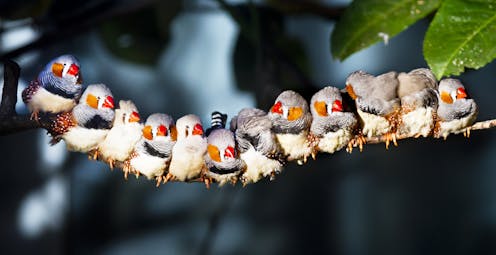Birdsong isn't just competition for mates or territory. Zebra finches sing to bond
- Written by Simon Griffith, Professor of Avian Behavioural Ecology, Macquarie University

When you hear beautiful birdsong, such as the warbling of the Australasian magpie, you might believe it’s a sign of intense competition for territory or showing off to attract a mate.
After all, that’s the way birdsong is often thought of – a way for male birds to compete with each other. A prettier version of nature red in tooth and claw, as Tennyson put it. There’s some truth to it – in many species, even the most beautiful song by a male in another’s territory will invite attack.
But birdsong isn’t one dimensional. In some species, birdsong is much less about competition and much more about social cooperation. Our study of highly social zebra finches found the song of the males boosts social cohesion in local populations. It even helps these tiny birds to coordinate their nest building, mating and reproduction when there’s about to be abundant food for their young.
So when you hear a melodious song, enjoy it. Nature isn’t just about competition. More and more, we’re learning cooperation is there too. In some species, birdsong promotes harmony at a species level – and boost bonding between a male and his partner.
What did we find?
Zebra finches travel in large flocks through Australia’s arid interior, looking for seeds. They’re highly social, and are known as a bird species able to learn new songs.
Zebra finches are one of Australia’s most-studied birds, because they’re easy to keep in captivity. But to discover how they act in the wild, we had to go remote to a study area near Broken Hill.
To capture their song, we installed more than 20 microphones and recorded them from dawn to dusk every four days over a whole year.
We chose this species because the males sing their own individually distinctive songs – and they do it relatively quietly, compared to the loudspeaker bugling of, say, a currawong.
That’s important. When birds sing softly, it’s a sign the song isn’t a warning about territory. Zebra finch songs can be heard only by birds within a few metres, and they’re often sung when birds perch together in the same bush. So why do they do it? When each male sings their own unmistakable songs, it lets others in the group figure out who is singing – and gauge how many males are close by.
Listen for yourself. The two songs below are from male zebra finches – but they’re clearly very different from each other.
What happens when you play one male’s song to another male? In more territorial and less social species, it would provoke a aggressive response. But in zebra finches, it has the opposite effect. It actually draws in other males closer to share the same space. That’s why you can often hear multiple males sing together in the same bush.
Song for social bonding
On our recordings, we heard zebra finches every day – even though it was in 2019, when one of the worst droughts in the last 100 years made conditions very poor. No finches even attempted to breed.
But then the climate cycle shifted from drought to rains and flood. Water drove grass growth – and that meant seeds were coming. The finches sensed this and began mating.
As the drought broke, we heard the males sing more, peaking around the time the female birds laid their eggs. This suggests zebra finch song is part of an ongoing “discussion” between a female and her partner, which helps synchronise their activity. Song is likely to be related to how birds feel. When food is abundant birds feel better and sing more. When individual finches hear lots of singing in the area they know others are also enjoying the conditions and it gives greater confidence in the decision to start breeding.
So if zebra finch males don’t sing to claim territory, are they doing it to show off to prospective mates? Nope. In these remarkable birds, the males tend to sing after they’ve found a partner. They sing to her while perching next to her on a branch, and they will sing regularly – even daily – over the years of their relationship.
The females of most singing species sing too. Female zebra finches, however, don’t sing.
We believe the serenading of the female zebra finch by her partner may play a similar social function to the commonplace song duets you can hear from Australian songbirds in suburbs or in the bush.
For instance, magpie-lark couples will sing a duet while doing a kind of dance, making distinctive, synchronised wing spreading, shoulder raising and body flicking movements.
Duetting magpie-larks.These duets help to strengthen the pair’s bond and help them coordinate their behaviour. These synchronised songs and visual displays also show the strength of their partnership, which can make territory intruders think twice. For zebra finches, it may be the male’s constant song is enough to keep the pair well bonded.
Australia is rightly famous for its birds, from raucous cockatoos to melodious songbirds. After all, birdsong evolved here first and spread to the rest of the world.
Now we know the zebra finch uses song as social bonding, we can look for this in other species around the world. We expect many other gregarious species will use song in ways more complex than marking territory or drawing in mates.
Birdsong is the animal sound we most regularly encounter – it’s part of the background of our lives. But for birds, it’s far beyond a pretty melody. It’s fundamental to how they live and who they are as a species.
Read more: Only the lonely: an endangered bird is forgetting its song as the species dies out
Authors: Simon Griffith, Professor of Avian Behavioural Ecology, Macquarie University





